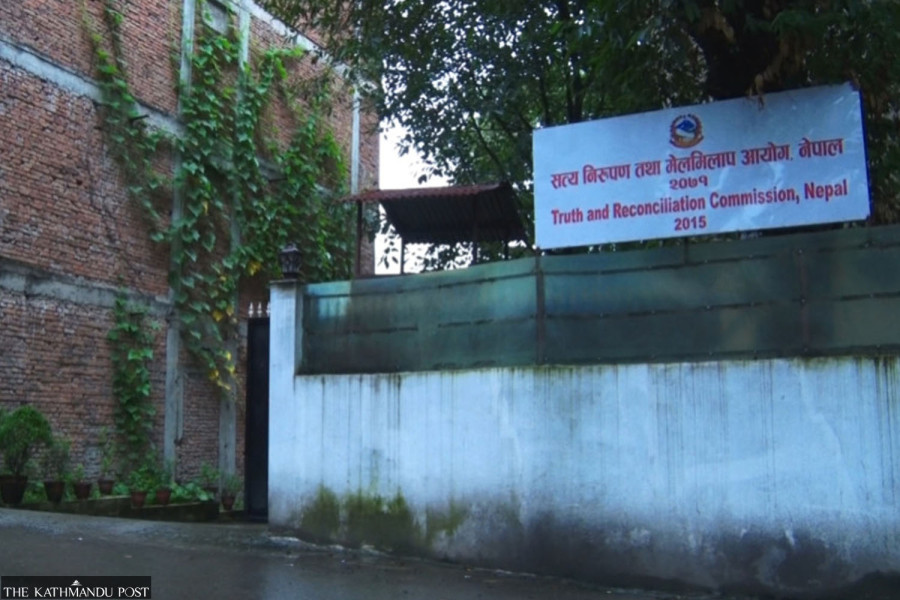National
Victims reject transitional justice shortlist, demand new selection panel
36 victims’ groups slam list for lack of transparency, clear criteria, and right candidates.
Binod Ghimire
Victims of the 1996-2006 Maoist insurgency have demanded the dissolution of the committee that shortlisted office-bearer candidates for the two transitional justice commissions, saying the process lacked transparency and was politically influenced.
The committee led by former Chief Justice Om Prakash Mishra had published a shortlist of 34 candidates out of 111 applicants on Sunday. Of them, eight have been recommended for chairpersons and the remaining as members.
Issuing a joint statement on Thursday, 36 different victims’ organisations and activists claimed that the shortlist lacks transparency, clear criteria, and a merit-based approach.
“The list includes individuals with political affiliations, close ties to power centres, and those lacking knowledge, expertise, or experience in transitional justice. This has raised serious questions about the credibility of the process,” said Ram Bhandari, coordinator of the National Network of the Victims of Serious Human Rights Violations, in a press meet. “We demand the formation of a new selection panel that includes victims’ representatives, by scrapping the current one.”
The insurgency-era victims from different backgrounds, who otherwise have been divided, came together after years to oppose the ongoing selection process. Stating that the shortlist excludes competent and committed individuals, the victim groups have claimed it is yet another example of how the transitional justice process has long been manipulated for political gains.
“Despite our repeated demands, the selection committee has not made public the criteria used to prepare the shortlist,” reads the statement.
They have also claimed that the shortlist was prepared without a proper evaluation of the applicants’ backgrounds. According to the victims, the secretariat of the selection panel sent emails to those nominated for chairpersons or members of the commissions by various organisations at 6:56 pm on April 24, instructing them to submit their necessary documents by the same day. The next day, another email was sent, asking for documents by April 26, which was a Saturday and a public holiday.
The shortlist was prepared the very next day. “How can the committee check the backgrounds of so many people in just a few hours? There are serious lapses in the selection process,” said Raju Prasad Chapagain, one of the applicants who received an email in the last hour. Sixteen organisations have nominated 31 individuals for chair or member positions.
Chapagain,who is among the 34 shortlisted candidates, has also withdrawn from the selection process so long as the credible committee is not formed.
Like the conflict victims, some applicants have also questioned the basis for shortlisting 34 candidates. Bishnu Pathak, a former member of the Commission of Investigation on Enforced Disappeared Persons, said, “We respectfully ask for the rationale and justification behind the selected candidates to be shared. Transparency is necessary not just for professional reputation and credibility of your institution but also for your [chair and members of the recommendation committee] personal reputation.”
Rajendra Centurey, another applicant, demanded to know the criteria, saying, “Such an arbitrary decision is unacceptable.”
The victim groups have warned of constituting a Citizens Commission, in participation with experts, as a parallel mechanism to the transitional justice mechanisms for revealing the truth, if the current ‘flawed’ selection process is not corrected. It will also list out the names of perpetrators at the citizen’s level, they claim.
“The justice delivery process that was supposed to commence within six months of the Comprehensive Peace Accord has seen 19 years wasted without results,” said Suman Adhikari, founding chairperson of the Conflict Victims Common Platform. “This is getting unbearable. I want to warn the government and the political parties that victims are running out of patience. How long do they want us to wait for a credible process to start?”
He claimed that one of the shortlisted candidates for the chairperson of the Truth and Reconciliation Commission, Sher Bahadur KC, was a legal advisor to the then home minister Khum Bahadur Khadka, who launched “Kilo Sierra 2” operation during the insurgency, which claimed at least 500 lives.
Similarly, KC had fought legal cases on behalf of the Nepal Army against the victims. “How can someone with a history of repeatedly standing against the victims be eligible to lead a transitional justice commission?” said Adhikari. “And how can we trust such a selection process?”
A government representative said they can only facilitate the recommendation committee, but cannot intervene in its jurisdiction. Agni Kharel, human rights and transitional justice advisor to Prime Minister KP Sharma Oli, said victims have every right to express their grievances, but the government cannot interfere with the committee’s work. “I believe the committee can listen to their grievances and take possible steps to address that. We can just suggest, but not interfere,” he said.
The Mishra-led five-member panel has called the shortlisted candidates to give presentations on how they would address transitional justice issues on May 8, 9 and 10. It will nominate 10 names based on the presentations.




 9.12°C Kathmandu
9.12°C Kathmandu















